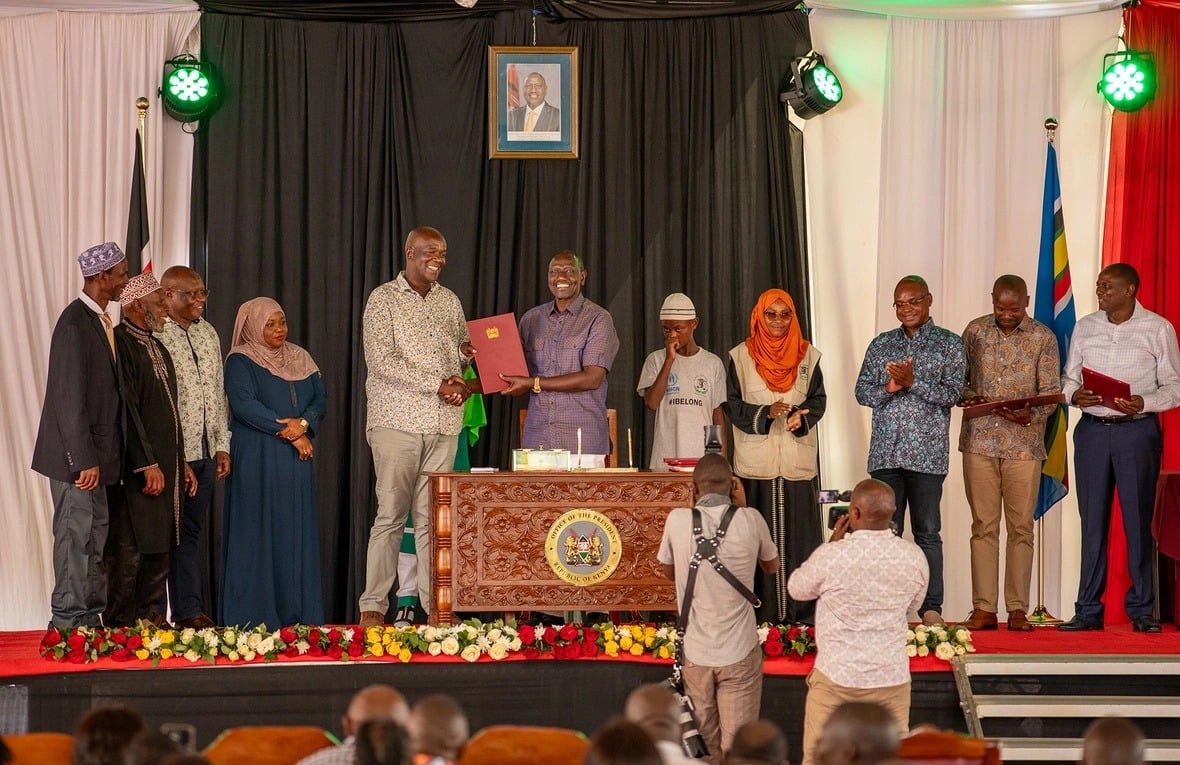
President William Ruto with members of the Pemba community and government officials witnessing the signing of the proclamation officially recognizing the Pemba as Kenyan citizens. © UNHCR/Charity Nzomo
GENEVA – UNHCR, the UN Refugee Agency, applauds the Government of Kenya for granting citizenship to members of the Pemba community. This decisive action is another step in their longstanding commitment to help eliminate statelessness in the country and improve the lives of thousands of people.
During a ceremony held on 28 July in Kilifi, on Kenya’s eastern coast, President William Ruto issued identification cards, birth certificates and passports to individuals from the Pemba community who have been living in the country for decades. This event marked the completion of the registration process for all 7,000 members of the Pemba community, allowing them to fully access key services like education, healthcare, social protection, financial services and the formal labour market.
UN High Commissioner for Refugees, Filippo Grandi said, “I applaud the Government of Kenya’s leadership in addressing many of the challenges facing uprooted people and for taking significant steps to eradicate statelessness in this country.”
“It is a great example of how States can put an end to statelessness and open the way for people caught up in this dreadful situation to come out of the shadows and participate fully in society,” said Grandi.
In recent years, Kenya has made important strides in efforts to resolve statelessness by recognizing as citizens thousands of other previously stateless people, including those from the Makonde and Shona communities and others of Indian descent. In December 2022, President Ruto announced that the Government would begin to officially recognize the Pemba as citizens of Kenya.
UNHCR, together with its partners, will continue providing technical and operational support to the Government as it continues to tackle statelessness in order to ensure stateless populations are registered as Kenyan citizens and can swiftly obtain Kenyan identity cards and other civil documentation.
This latest decision is welcome progress in the Government of Kenya’s commitment to fulfil its pledges at the High-Level Segment on Statelessness in October 2019, including accession to the two UN statelessness conventions. UNHCR remains committed to working with and providing support to the Government of Kenya and other countries across Africa and globally to further identify, prevent and resolve statelessness in accordance with the goals of the #IBelong Campaign to end statelessness by 2024.
The international legal definition of a stateless person is “a person who is not considered as a national by any State under the operation of its law”. In simple terms, this means that a stateless person does not have the nationality of any country. Some people are born stateless, but others become stateless.
Stateless people are found in all regions of the world. The majority of stateless people were born in the countries in which they have lived their entire lives.
Statelessness often has a severe and lifelong impact on those it affects. The millions of people around the world who are denied a nationality often fight for the same basic human rights that most of us take for granted. Often they are excluded from cradle to grave— being denied a legal identity when they are born, access to education, health care, marriage and job opportunities during their lifetime and even the dignity of an official burial and a death certificate when they die. Many pass on statelessness to their children, who then pass it on to the next generation.
UNHCR is mandated by the UN General Assembly to identify and protect stateless people and to prevent and reduce statelessness. On 4 November 2014, UNHCR launched the #IBelong Campaign to End Statelessness by 2024.
Share on Facebook Share on Twitter